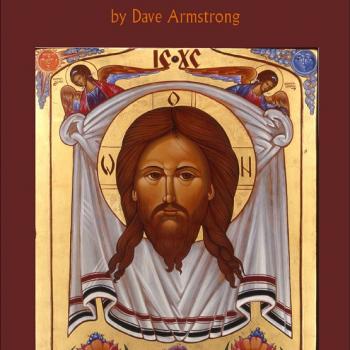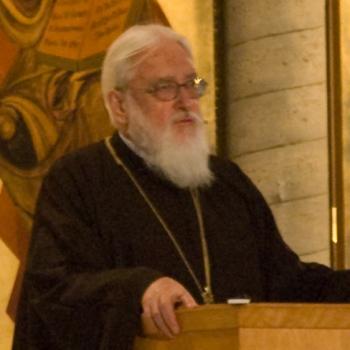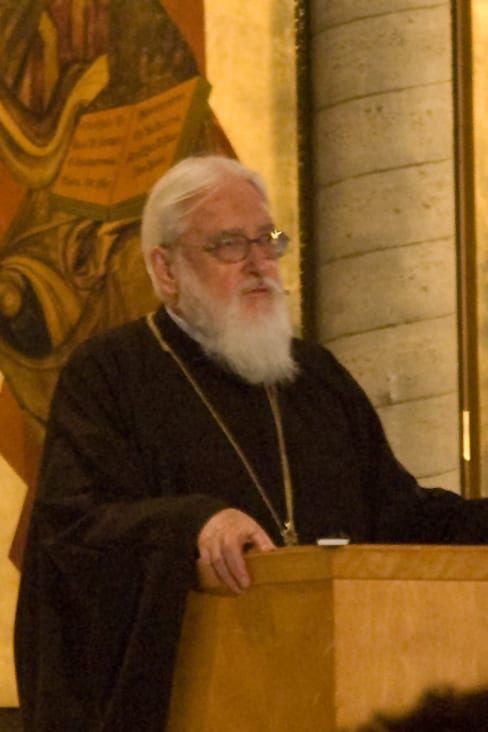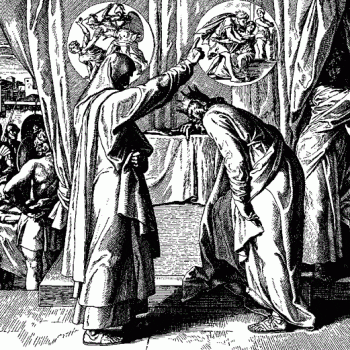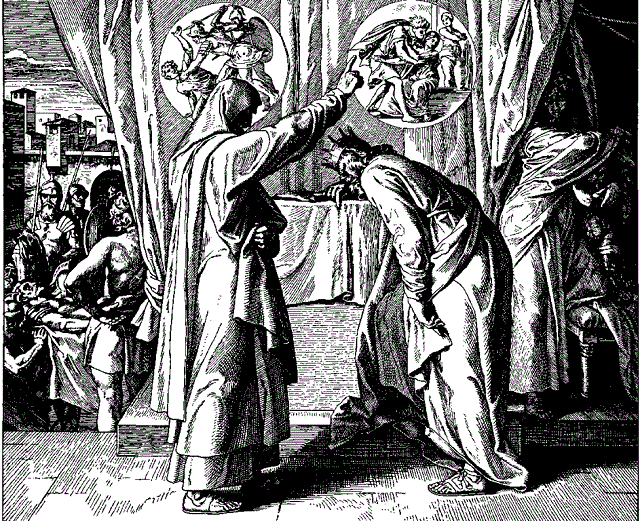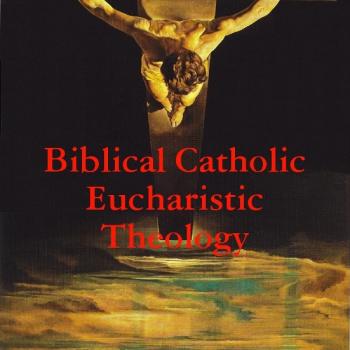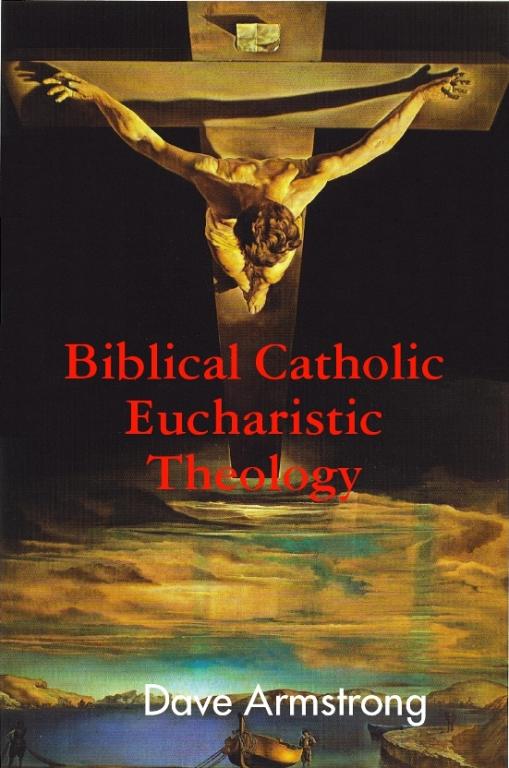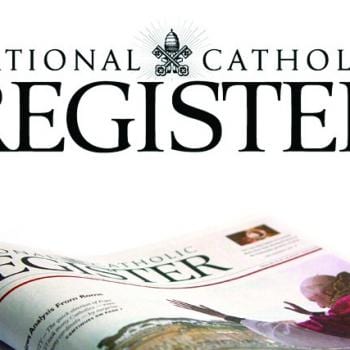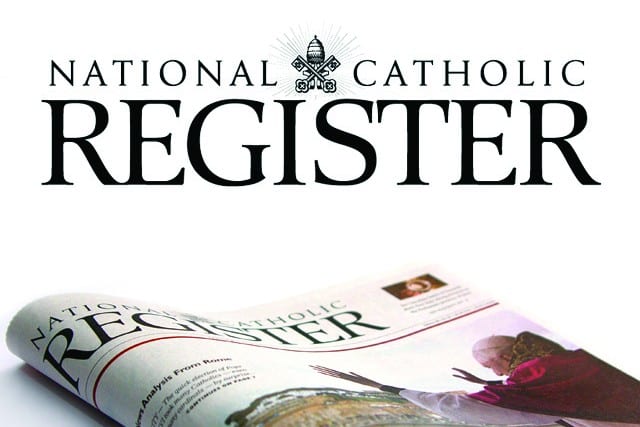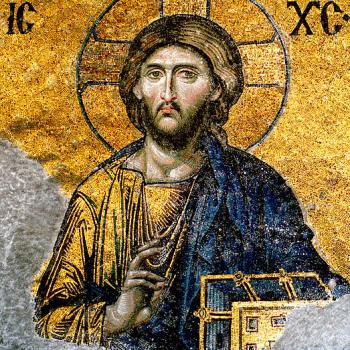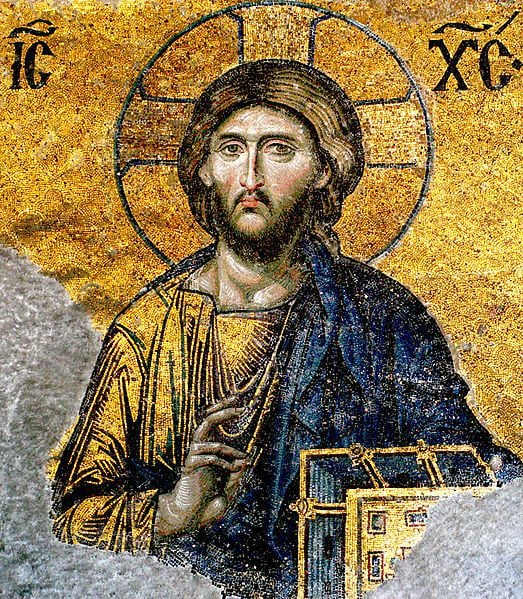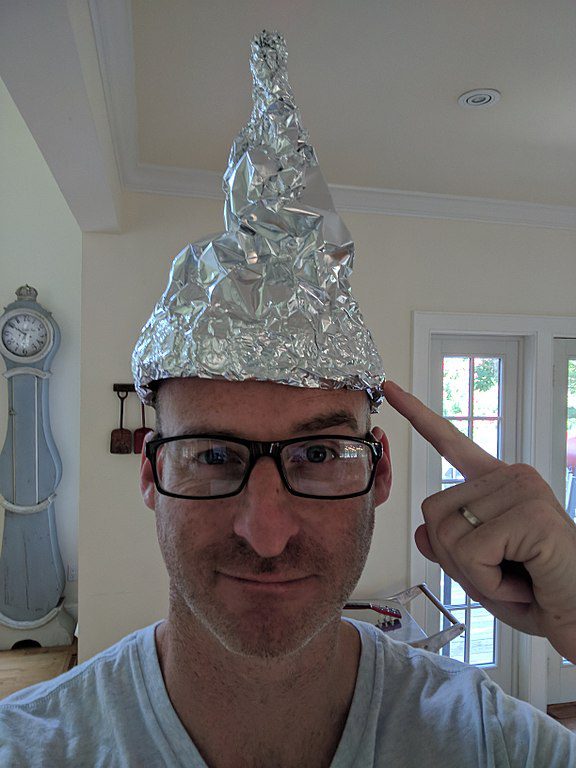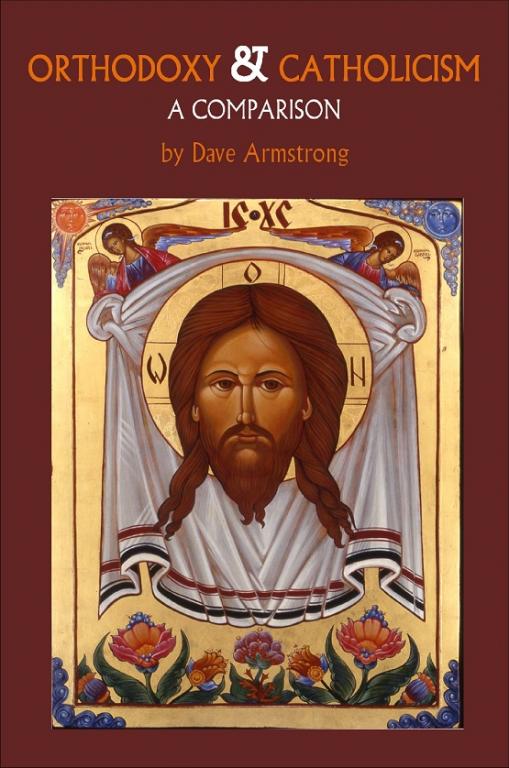
From my book, Orthodoxy and Catholicism: A Comparison : 3rd revised edition, 2015; co-author: Fr. Deacon Daniel G. Dozier, whose words below will be in blue. This was drawn from chapter five: pp. 75-103.
***
The following is directly based on a discussion with two Orthodox Christians on a public Internet board. I will do my best to reproduce their arguments and to not misrepresent them. The differences here are important, I think, in understanding the different approaches to theology and philosophy between the two groups (generally speaking).
The first charge my friends made was that St. Anselm (c. 1033-1109), in his famous work, Proslogion, sought to use reason alone to prove God’s existence, (even the Christian God’s existence). They deemed this effort as “hyper-rationalistic.” In fact, St. Anselm’s aim and goal in his work was stated clearly enough:
. . . I have written the following treatise, in the person of one who strives to lift his mind to the contemplation of God, and seeks to understand what he believes. . . I accordingly gave [this work] a title . . . faith seeking understanding. (St. Anselm: Basic Writings, translated by S.W. Deane, La Salle, Illinois: Open Court Pub. Co., 2nd edition, 1962, 2; emphasis added)
St. Anselm goes on to give his famous ontological argument. Far from this being a merely logical, solely rationalistic ploy, however, and denying the crucial role of revelation in any way; to the contrary, he is arguing that belief in God is pre-rational: it is already there in the mind, put there by God (as a sort of unproven axiom).
I think this is why the argument appeals to Calvinist presuppositionalists (such as the prominent philosopher Alvin Plantinga): precisely because it is distinct from the more strictly “logical” or “empirical” arguments of St. Thomas Aquinas. At any rate, he is not “proving” the Christian God by reason alone, but seeking to better understand what he already believes by faith. So this is a “bum rap.”
Philosopher Richard Taylor, in his Introduction to the book The Ontological Argument (edited by Alvin Plantinga, Garden City, New York: Doubleday Anchor, 1965, viii), supports my contention:
St. Anselm set forth his argument as an address to God. It is obvious, then, that he was not attempting to discover whether God exists. He was already perfectly convinced by faith of the reality of the Judaic-Christian God, conceived as a supreme being. His argument thus represents his attempt to understand, by his mind or reason, that which he already firmly believed by his faith or, as he expressed it, in his heart.
Thus, St. Anselm and those who reason in the same fashion (even including Scholastics and admirers of Aquinas), are not at all being “hyper-rationalistic.” They are merely “loving God with their mind” as well as their heart.
The Catholic, in constructing such theistic arguments from reason, is simply being biblical (and, for that matter, evangelistic / apologetic). To run these efforts down is, I say, to be unbiblical and very much unlike St. Paul (say, at Mars Hill in Athens), whom we are to imitate, and that is every bit as unbalanced and objectionable, if not much more so, as our so-called “hyper-rationalism” which the best Catholic thinkers do not follow in the first place. We are simply giving reason its proper place at the table, along with the “heart” and “soul,” as our Lord Jesus commanded us to do.
Do some Catholics go too far? Yes, of course. But if we are to talk about an entire system of theology and a Church, we must deal with its greatest teachers, not its worst representatives. Orthodox apologists and polemicists often go after Anselm as a “rationalist,” but that has been shown to be incorrect.
Likewise, even Met. Kallistos (who should know better) goes after “Scholastic theology” (by extension, St. Thomas Aquinas, who basically started that school), in his quote below. It is objectionable that this common Orthodox critique runs down some of our greatest theologians and philosophers, who hold to no such notions. Yet Kallistos Ware makes the following astonishing observation:
Latin Scholastic theology, emphasizing as it does the essence at the expense of persons, comes near to turning God into an abstract idea. He becomes a remote and impersonal being . . . a God of the philosophers, not the God of Abraham, Isaac, and Joseph. (Bishop Kallistos (Timothy) Ware, The Orthodox Church, New York: Penguin Books, revised 1980 edition, 222)
Who else did Met. Kallistos have in view? Who are these Catholic “philosophers” who had such an atrocious theology of God? One might try to bring up certain nominalistic theologians, but we agree that that was a corruption of Scholasticism, actually breeding many errors of early Protestantism, so that would be equating the corruption with the real thing, just as Luther did, thinking that nominalism was the Scholasticism that he so hated, and heaped scorn upon. In both cases a caricature and straw man is set up and then despised.
The burden of proof is on the one making the charge. Orthodox who believe this need to show us where a reputable Catholic theologian (Scholastic or otherwise) teaches that God is “remote and impersonal.” It’s ludicrous. Catholics are not deists. One doesn’t have to disprove a groundless charge. If Met. Kallistos had qualified the statement he might have pulled it off, with the usual derisive remarks about western philosophy, with which we are well familiar. But he did not. He painted with a mile-wide brush.
To provide just one example of literally hundreds that could be brought forth to refute these outrageous assertions: I recently completed my book, Quotable Catholic Mystics and Contemplatives (2014). It was striking how all fourteen mystics or mystical works drawn from in the book, without exception, taught theosis, or divinization, or deification (as it is variously known): the notion that one enters into a profound union with God.
This is often falsely thought to be particularly or even exclusively an Orthodox belief. Needless to say that it completely goes against the assertions of a “remote god” that we so often hear.
The fourteen sources in my book included five Doctors of the Catholic Church and five orders of the Church Dominican (3) [St. Thomas Aquinas’ own], Augustinian (2), Carmelite (2), Franciscan, and Cistercian. The section on theosis runs from page 80 to page 93: all simply quotations from these great mystics and contemplatives. I shall cite just one of these, from St. John of the Cross (1542-1591): a Doctor of the Church:
In thus allowing God to work in it, the soul (having rid itself of every mist and stain of the creatures, which consists in having its will perfectly united with that of God, for to love is to labour to detach and strip itself for God’s sake of all that is not God) is at once illumined and transformed in God, and God communicates to it His supernatural Being, in such wise that it appears to be God Himself, and has all that God Himself has. And this union comes to pass when God grants the soul this supernatural favour, that all the things of God and the soul are one in participant transformation; and the soul seems to be God rather than a soul, and is indeed God by participation; although it is true that its natural being, though thus transformed, is as distinct from the Being of God as it was before, even as the window has likewise a nature distinct from that of the ray, though the ray gives it brightness. (Ascent of Mount Carmel, Bk. II, ch. 5)
Does this sound like anything in the same universe as “a remote and impersonal being”? It’s ludicrous. Now, the retort would probably be that Met. Kallistos was referring only to the Scholastics, and in context, probably only some of those. Maybe so, but it still remains a general critique from certain sectors of Orthodoxy, and St. Thomas Aquinas is often a major recipient of the scorn. But he taught theosis, too! The following statements all come from his Summa Theologica:
Now the gift of grace surpasses every capability of created nature, since it is nothing short of a partaking of the Divine Nature, which exceeds every other nature. And thus it is impossible that any creature should cause grace. For it is as necessary that God alone should deify, bestowing a partaking of the Divine Nature by a participated likeness, as it is impossible that anything save fire should enkindle. (ST 1-2, q. 112, a. 1c)
. . . the worth of the work depends on the dignity of grace, whereby a man, being made a partaker of the Divine Nature, is adopted as a son of God, to whom the inheritance is due by right of adoption, according to Rm. 8:17: “If sons, heirs also.” (ST 1-2, q. 114, a. 3c)
The head and members are as one mystic person; and therefore Christ’s satisfaction belongs to all the faithful as being His members. (ST 3, q. 48, a. 2, ad 1)
. . . grace is nothing else than a participated likeness of the Divine Nature, according to 2 Pet. 1:4: “He hath given us most great and precious promises; that we may be partakers of the Divine Nature.” (ST 3, q. 62, a. 1c)
. . . one can be changed into Christ, and be incorporated in Him by mental desire, even without receiving this sacrament [the Eucharist]. (ST 3, q. 73, a. 3, ad 2)
To be fair, one of my dialogical opponents later admitted that he had confused St. Anselm’s Monologion and Proslogion, and clarified that he was not arguing that Anselm was hyper-rationalistic, but rather, how he might “seem” that way to an “honest reader.” That’s acceptable; however, the general thrust of the argument is highly typical of much anti-Western Orthodox polemics.
Those who interpret St. Anselm in such a manner are neglecting the totality of his Christian theological views. Orthodox often imply that St. Anselm (and, by implication, many Catholic thinkers) make arguments from reason alone, and object that this is improper, unbiblical, and ultimately (at some point) at cross-purposes with both faith and mystery (grounded in revelation or Sacred Scripture).
My point, on the other hand, is that these arguments must be understood in a broader context: that they are never intended in terms of being in opposition to faith or revelation or mystery, but to complement them. This ties in to the common Orthodox critiques of western “hyper-rationalism.”
We contend that such analyses create dichotomies where they do not exist: that is, between faith and reason. We hold the two together in harmony. We don’t see that they are opposed to each other, or contradictory, or contraries; at odds with each other, pitted against each other, either in Scripture or in philosophy and theology.
For the Catholic, reason and faith are complementary (but faith is the far more important of the two). It is proper to use reason to a great extent in seeking to understand God and theology, because, indeed (as our Lord commanded us), we are to love God with our “minds” as well as our hearts. When the Orthodox seem to denigrate the role of reason in theology and Christian life, saying that Catholics go too far, they are, from our perspective, creating unbiblical dichotomies and placing reason lower in the scheme of things than the New Testament places it.
The Orthodox general view on this matter (as far as I understand it) is something like the following: faith is primary. Reason can be used to a degree in understanding faith and theology, but it doesn’t extend nearly as far as Catholic western “rationalism” takes it. Catholics speculate unduly and improperly on sacred, spiritual mysteries that are beyond human reason, thus undermining faith and belief in (and worship of) the Divine Persons, rather than merely philosophical “essences” or constructs, ultimately creating the milieu for (potentially) a detached, skeptical rationalism (detached from theology) to take hold.
What is particularly outrageous is that Met. Kallistos Ware not only asserted that western “Latin Scholastic theology” went too far in reasoned speculation, but that this somehow almost changes the very nature of God, in the mere exercise of it (“. . . at the expense of persons, comes near to turning God into an abstract idea”). The only qualification is the word “near,” but that doesn’t soften the falsehood all that much.
Discussing God’s essence does not in the least imply that therefore the Personhood of God is minimized. This simply does not follow. It’s an arbitrary dichotomy to assume that reason and faith are somehow opposed to each other, in a zero-sum game relationship (i.e., when one increases, the other decreases).
It was the deists who held to a “god” like this: a concept that flowed not from Catholic thought, but rather, from a deliberate rejection of it. The philosophes of France, like Rousseau and Voltaire, thought very little of the Catholic Church. More radical French revolutionaries (some outright atheists) sought to overthrow the Church altogether, and to enthrone a “goddess of reason.” This was much of the point of the French Revolution, along with overthrow of the monarchy.
Likewise, the British and American deists of the period, had, of course, very little connection with Catholicism: as the religion was still illegal in England and miniscule in numbers in America. None of this has the slightest connection to the 13th-century Catholic theology of God.
When we examine someone like St. Anselm, we need to ask ourselves what he is trying to accomplish, and from what axioms or premises he is proceeding, in his thought and arguments. He clearly states that his starting assumption is the Christian faith. The Proslogium, as an argument, is expressly intended within a Christian framework, as already noted.
The Monologium, on the other hand, takes a different approach. It tries to argue from reason alone, so as to reach the person who is at that place in his understanding, not yet in possession of faith, or the faith, as it were. Does this mean that Anselm “suspends” his own belief or momentarily becomes an atheist in order to make his argument, or pretends that he is not a Christian? No, not at all. What he is doing is precisely what Paul talked about, in his own evangelistic efforts and strategies:
1 Corinthians 9:19-23 [RSV] For though I am free from all men, I have made myself a slave to all, that I might win the more. [20] To the Jews I became as a Jew, in order to win Jews; to those under the law I became as one under the law – though not being myself under the law – that I might win those under the law. [21] To those outside the law I became as one outside the law – not being without law toward God but under the law of Christ – that I might win those outside the law. [22] To the weak I became weak, that I might win the weak. I have become all things to all men, that I might by all means save some. [23] I do it all for the sake of the gospel, that I may share in its blessings.
Thus, the Christian apologist can do the same thing. To the atheist we become (in a purely rhetorical sense, “for the sake of argument”) “as an atheist” (not an atheist, as if we are intellectual chameleons). Paul assumed the Jewish mindset in order to argue with the Jews, “though not being without the law,” as he explains. This is common sense, it is an excellent means of winning them over; it is an act of charity; it is not forsaking his own beliefs for a moment.
Christian apologists can follow St. Paul’s example as the greatest evangelist of all time. There is nothing wrong with this whatsoever. If Orthodox disagree, then they must have a huge problem – bottom-line – with St. Paul, not the straw man of Catholic so-called “hyper-rationalism.”
And this is not the only biblical argument. St. Paul takes the same approach on Mars Hill in Athens. He seeks common ground with the pagan Greeks, in order to build bridges. Does this mean that he momentarily believed in the different Greek gods, or “the unknown god,” in so arguing? Again, of course not:
Acts 17:22-23 So Paul, standing in the middle of the Are-op’agus, said: “Men of Athens, I perceive that in every way you are very religious. [23] For as I passed along, and observed the objects of your worship, I found also an altar with this inscription, `To an unknown god.’ What therefore you worship as unknown, this I proclaim to you.
He cites their own poets later on in the discourse. Now what is wrong with this? Absolutely nothing! It is the biblical methodology of evangelization. The third biblical passage of great relevance is Romans 1, where St. Paul tells us that men can indeed know that God exists by simply observing the universe. This is an argument purely from reason, before one gets to theology (natural theology).
Neither Paul nor Catholics (not even St. Thomas Aquinas) think that men can come to know the Triune God of the Bible in all His fullness by reason alone. That requires revelation as well. But they can know quite a bit indeed:
Romans 1:18-20 For the wrath of God is revealed from heaven against all ungodliness and wickedness of men who by their wickedness suppress the truth. [19] For what can be known about God is plain to them, because God has shown it to them. [20] Ever since the creation of the world his invisible nature, namely, his eternal power and deity, has been clearly perceived in the things that have been made. So they are without excuse;
This is God’s infallible revelation, not just my own “Catholic” argument. Orthodox must deal with this. None of it entails a denigration of God or some silly notion that He becomes “remote and impersonal” or merely a “God of the philosophers, not the God of Abraham, Isaac, and Joseph,” as Met. Kallistos and many other Orthodox apologists claim. And that is because the arguments from reason do not purport to change God’s nature; God Himself, at all.
The Lord God Almighty is Who He is, regardless of how someone attempts to explain or proclaim Him. They are simply “tactical” means, used to reach men who don’t yet possess the understanding of revelation or Christian background and understanding. If they are consistent with truths known from revelation, there is nothing at all improper about them (as truth is truth), and Met. Kallisto’s charge is an absolute falsehood. They don’t entail any denial of Christian belief.
Eastern Church fathers agree with my analysis, in commenting on this passage:
God has placed knowledge of himself in human hearts from the beginning . . . He put before them the immense creation, so that both the unwise and the unlearned, the Scythian and the barbarian, might ascend to God, having learned through sight the beauty of the things which they had seen. (St. John Chrysostom, Homilies on Romans 3; NPNF 1, 11:352)
These things apply to all human beings who possess natural reason. Yet they more specifically apply to those called philosophers . . . to perceive in their minds the things which are invisible. (Origen, Commentary on Romans; CER 1:142)
. . . the world . . . is truly a training place for rational souls and a school for attaining the knowledge of God. Through visible and perceptible objects it provides guidance to the mind for the contemplation of the invisible. (St. Basil the Great, Homily One, Creation of the Heavens and Earth 1.6; FC 46:11)
St. Anselm was merely applying the Pauline principle: “to those without Scripture, I became as without Scripture, though not without Scripture myself.” Was St. Paul also a “hyper-rationalist”? Whatever applies to St. Anselm in this critique also applies to St. Paul.
So either the critique collapses (and it is a very common Orthodox one), or we need to be shown what essential difference between St. Anselm and St. Paul makes the former “hyper-rationalistic”, whereas the latter was not. Does St. Anselm use reason? Yes. Does St. Anselm use reason alone? Yes (sometimes). Is either intended to be in some sort of opposition to faith and mystery or biblical revelation? No. Does St. Paul use reason? Yes. Does St. Paul use reason alone (sometimes)? Yes. Is either intended to be in some sort of opposition to faith and mystery or biblical revelation? No. I rest my case.
Reason is always necessary, in any view, and we all use it, whether we are aware of it or not, in adopting one particular framework and epistemology over against another. How one arrives at unproven axioms is another huge discussion.
At this juncture in the discussion, my Orthodox friends stated that Anselm had adopted St. Augustine’s approach with regard to faith and reason, and that he incorporated Platonism into Christian theology. If this is so, it is no different than what St. Gregory Nazianzus and Dionysius the Areopagite did, according to Jaroslav Pelikan, the Lutheran-then-Orthodox Church historian, who stated that the philosophical influence (mostly Platonic)was as prevalent in the last five centuries of Byzantium as it has been anywhere else.
St. Gregory Palamas fused Platonic and Aristotelian elements in his philosophical theology. Some Eastern fathers before Anselm and Orthodox saints after did the same thing. Everyone has a philosophy. Everyone reasons, and classical logic was formulated by the ancient pagan Greeks, not the ancient Hebrews. It’s unavoidable.
My friends continued on, observing that Western theology was based on “rational thought” whereas Orthodoxy was hesychastic (a tradition of inner, mystical prayer). I contend, on the other hand, that both have both elements. Catholicism has plenty of mystics (I just compiled a book of them) and Orthodoxy has plenty of rationality. It is silly to describe things in such black-and-white terms. It isn’t helpful for understanding and creates more division. If St. Paul can “do philosophy,” so can everyone else.
Nothing in Catholicism is unalterably opposed to mysticism. Quite the contrary; we have mystics who can more than match up with Orthodox holy men (St. Francis of Assisi, St. John of the Cross, St. Therese of Liseux, Thomas a Kempis). The stigmata, for example, or Marian apparitions, can hardly be classed as a species of “rationalism,” and G. K. Chesterton wrote books about both St. Francis and St. Thomas Aquinas, glorying in the fact that the Catholic Church can include both entirely different sorts of Christians without having to pit them against one another.
Yet the anti-Western impulse in Orthodoxy is alive and well (hopefully as a minority position); particularly in this attack on a supposed excessive Catholic reliance on reason. For example, here is an observation from Fr. Seraphim Rose, a major, revered recent Orthodox figure:
[In Scholasticism], logicalness becomes the first test of truth, and the living sources of faith second. Under this influence, Western man loses a living relationship to truth. Christianity is reduced to a system, to a human level . . . It is an attempt to make by human efforts something better than Christianity. Anselm’s proof of God’s existence is an example – he is “cleverer” than the ancient Holy Fathers. (Not of this World: The Life and Teaching of Fr. Seraphim Rose, Monk Damascene Christensen, Fr. Seraphim Rose Foundation, 1993, 591)
Apparently, St. Gregory Palamas was “cleverer” than the ancient Fathers, too, then, since he found a new way to synthesize hesychasm and apophatic theology in the 14th century, teaching that man could mystically know and experience the energies of God but not His essence, using a synthesis of Platonist and Aristotelian philosophy to do so.
As a Catholic, I think St. Gregory Palamas is great. I think theosis is great. My problem is that I see no big difference in Anselm’s (or Aquinas’s) reasoning. Several Orthodox participants in my old Internet list discussion group even went to the extreme of claiming that Catholics worship a different “god,” some citing the same quote from Met. Kallistos above, that I have been objecting to.
As the dialogue went on (and degenerated into a non-constructive haggling; ships passing in the night), I asked for “facts” in our theology that would suggest anything near to such an imagined thing. I got nothing. I asked for clarification and got none. I dealt with what I believe to be the proper place of reason within faith by giving several biblical examples (which were also utterly ignored). I requested citations. What did I get?: again, nothing.
If some Orthodox wish to be so opposed to reason and rationality that they can’t even explain their belief-system and religious practice at all to an outsider, then I suppose there is a certain consistency to that. Completely non-rational or anti-rational beliefs can only be experienced, not reasoned through or explained, by definition. I deny that historic Orthodoxy is “non-rational,” yet so often this is the type of thinking that its adherents exhibit.
The other frequent target (along with St. Augustine) of the legions of Orthodox who take a dim view of “Western rationalism,” is, of course, St. Thomas Aquinas. Indeed, Catholics approach theology a little more abstractly and philosophically than the Orthodox do (and some strains of Protestantism).
But philosophical speculation and cosmological, ontological, and teleological arguments don’t rule out devotion or wonder or obedience or mysticism or prayer or worship. Our speculation (a la Aquinas) doesn’t change the character or nature of God (in our own minds and hearts) any more than scientific speculation and observation change the laws of nature.
Einstein and a 3-year-old child could both look at the nighttime starry sky and marvel at it. There is a huge difference in understanding and perception between the two, but that didn’t make the universe any less wondrous to Einstein (as he often expressed). The wonder and “mysticism” were still there, and reason and science didn’t wipe them out.
Orthodox (and many Protestants) often seem to act as if whenever Catholics merely apply reason to some theological matter, all other aspects of Christianity are somehow nullified or minimized. This is what Lutheran-turned-Catholic writer Louis Bouyer called the “dichotomous tendency.” We simply don’t have to choose between reason and devotion, reason and revelation, reason and mysticism, etc. These are all false dilemmas.
We see the same “both/and” outlook in St. Thomas Aquinas himself, who wrote wonderful prayers and devotional meditations, had a profound devotion to the Blessed Virgin Mary, was exceedingly humble, and ended his life in a pronounced mystical state. He devoted his life to the synthesis of reason and revelation, and defense of the faith against Islam and other threats.
The early (pre-schism / undivided) Church engaged in the most rigorous logical / biblical argumentation concerning the nature of God the Father and God the Son. A great deal of fuss was made about one word: homoousios. The Church thought that it was supremely important to establish that Christ had two wills rather than one (contra the heresy of Monothelitism), and that Christ had two natures (contra the heresy of Monophysitism).
The fathers engaged in extensive arguments with the heretical Sabellians about the Three Persons of the Godhead (as opposed to “modes” or “operations”), and the more blatantly heretical Arians, who thought Jesus was created, and with the Nestorians, who thought Christ was two Persons rather than one God-Man.
All of this had to do with the Holy Trinity, and certainly involved “conceiving” to a great degree the supposedly “inconceivable” God. God is comprehensible insofar as He has revealed Himself, and we can understand a lot about God, for that reason. Can we know everything? Of course we cannot. That is not at issue.
I believe that personal devotion to God is one area in which the Orthodox excel: a strong point. But it is a different consideration altogether when it is implied that Catholics place reason too high in the scheme of things. We think others are placing it too low. Catholics always try to achieve a balance, a “golden mean,” a harmonious whole, a synthesis. Faith and reason, faith and works, orthodoxy and orthopraxis, theology and devotion, marriage and celibacy, Scripture and tradition, Church and tradition, popes and councils, etc., etc.
Orthodox object that transubstantiation is delving into an “unfathomable mystery” and that it should simply be regarded as a mystery that finite minds cannot understand. But then why do Orthodox concentrate so much on the Filioque? Is that not equally mysterious (if not much more so)? All Christians agree that there are three Persons who are God, and that these three Persons are equal in essence, power, and glory. All are eternal, and worthy of worship. One took on human flesh to come and die on our behalf, etc., etc. Why make the complicated and ultimately unfathomable relations of the three Divine Persons a matter of ecclesiological separation?
The West seems quite content to let the East analyze the Filioque in their own fashion. We see it as a complementary understanding. Yet when it comes to transubstantiation, the Orthodox often accuse us of “delving into what is an unfathomable mystery.” Well, what is more of a mystery than the Holy Trinity?
The essence of the Christian doctrines are theological and spiritual / mystical, not philosophical. Philosophy helps us to further understand the revealed truths of Scripture and tradition. We accept certain things as axiomatic on the basis of revelation and apostolic proclamation (kerygma). We don’t have to understand every jot and tittle to yield to this authority (hence, the utility of development as history flows on).
The very notion of development is an assumption that the same doctrines can be understood in greater depth by philosophy, reflection, battles with heretics, prayer, new social and ethical problems, the accumulated wisdom of the faithful, the Church, and experience, etc. Therefore, it is not at all inconsistent (or, surprising) for a later philosophy to be introduced in order to explain an apostolic doctrine. One is the servant of the other; they are not the same thing. No single philosophy rules in Christianity.
Reason can utilize various philosophies in order to elaborate on Christian belief, because the philosophies and the beliefs are two different things. That is why it is no contradiction to say that a doctrine remains apostolic, while it is being “filtered,” so to speak, through a new means of philosophical or epistemological understanding (such as Scholasticism).
Another Orthodox myth (which appears common, judging by how often I have encountered it on the Internet) holds that St. Thomas Aquinas died in a state in which he renounced his work, and possibly the Catholic Church. St. Thomas was setting out for the Ecumenical Council of Lyons when he struck his head and died soon after. On his deathbed, he said:
I have taught and written much on this most holy Body and the other sacraments, according to my faith in Christ and in the holy Roman Church, to whose judgment I submit all my teaching. (in James A. Weiseipl, Friar Thomas D’Aquino; His Life, Thought, and Work, New York: 1974, 326; cited in Warren H. Carroll, The Glory of Christendom, Front Royal, Virginia: Christendom Press, 1993, 298)
This hardly sounds like a man who has rejected his own work, let alone the Catholic Church. We don’t make a dichotomy between mysticism and reason (or devotion). All are crucial; all are Christian, and pious. St. Thomas combined all these aspects in both his teaching and in his person. This is the Catholic way: always a balance; everything in its proper place, and degree. St. Thomas Aquinas exemplified it to an extraordinary degree.
Orthodox theologian David Bentley Hart scathingly critiques this prevalent strain of anti-western thought in Orthodoxy:
Since at least the time of Vladimir Lossky it has become something of a fixed idea in modern Orthodox theology that Western theology has traditionally forgotten the biblical truth that the unity of the Trinity flows from the paternal arche and come to believe instead that what constitutes the unity of God is an impersonal divine essence prior to the Trinitarian relations. It was Theodore de Regnon who, in 1892, first suggested a distinction between Western and Eastern styles of Trinitarian theology: the tendency, that is, of Latin thought to proceed from general nature to concrete Person, so according priority to divine unity, and of Greek thought to proceed from Person to nature, so placing the emphasis first on the plurality of divine Persons. This distinction was not made in order to suggest a dogmatic superiority on either side, of course; nor, I think, was it very true.
But it was seized upon, rather opportunistically, by a number of 20th-century theologians, and now we find ourselves in an age in which we are often told that we must choose between ‘Greek’ personalism and ‘Latin’ essentialism. And, supposedly, this is a difference that goes all the way back to the patristic period (at least, if certain extremely misleading interpretations of Augustine and Gregory of Nyssa are to be believed). It has become so lamentably common among my fellow Orthodox to treat this claim that Western theology in general posits some ‘impersonal’ divine ground behind the Trinitarian hypostases, and so fails to see the Father as the ‘fountainhead of divinity’, as a simple fact of theological history (and the secret logic of Latin ‘filioquism’) that it seems almost rude to point out that it is quite demonstrably untrue, from the patristic through the medieval periods, with a few insignificant exceptions. (“The Myth of Schism”: see full source information in Chapter One)
Fr. Deacon Daniel Dozier
“As a light from the west
he has illumined
the Church of Christ
the musical swan
and subtle teacher.
Thomas the all-blessed,
Aquinas by name,
to whom we, gathered together, cry:
Hail, universal teacher!”
— 15th century Byzantine canon composed by Bishop Joseph of Methone
This particular chapter touches upon many issues that frequently come up in debates between Western Catholics and Eastern Orthodox, namely the historical relationship between reason and faith as it relates to theology in general and Scholastic theology in particular. Part of the issue hinges on prevailing popular narratives and historical assumptions about scholasticism as a theological method, as well as residual biases that periodically appear on both sides related to the respective emphases on reason over faith or faith over reason or even faith in opposition to reason or vice versa. As Dave alludes to, the points of view and historical record is far more nuanced, though no less provocative in certain cases, than the polemicists would prefer.
Scholasticism as a theological method is defined as a systematic doctrinal synthesis of the teachings of Scripture, patristics, and Greek philosophy, that attempts to bring together both human and divine wisdom in a coherent, cohesive, and in certain cases, comprehensive presentation. Although evidence of such an attempted reconciliation and synthesis of human and divine wisdom can be found throughout the patristic period, although its development in the early medieval West began in the 8th and 9th centuries through the establishment of monastic schools in Europe. The period of “High Scholasticism” culminates in the 13th and 14th centuries, most especially with the work of the University of Paris and the development of the schools of the more Platonic Franciscan and more Aristotelian Dominican Scholasticisms represented by the two great luminaries, St. Bonaventure and St. Thomas Aquinas respectively.
What is little known (and even less frequently acknowledged by some Orthodox polemicists) is that Orthodoxy also developed its own form of “Byzantine Scholasticism” around the same period, but less as an outgrowth of any university system and more as part of a tradition employing reasoned arguments in favor of the faith, developed especially by St. John of Damascus in his Fount of Knowledge. St. Photios the Great was also a practitioner of this method in the 9th century, as was St. Gregory Palamas. (See Orthodox theologian, Marcus Plested’s excellent Orthodox Readings of Aquinas, Oxford University Press, 2012.)
This is not to say that the methods employed in both Latin and Byzantine Scholasticism were the same substantively or stylistically, but it does undermine the false narrative that the employment of logic and appeals to reason in theological matters are themselves a purely Western – and ergo disfiguring – development.
What is more, around the middle of the 14th century, the writings of Aquinas were translated into Greek, sparking a period of energized discussion, debate and reception by Byzantine theologians during the period. According to Plested, however, far from a universal rejection of Aquinas, there appeared to be an enthusiastic embrace of his works across the spectrum of theological schools of thought during this period. He notes:
All this does not amount to a wholesale approval of Thomas, still less to a school of “Byzantine Thomism,” but it indicates that the supposition of methodological incompatibility between East and West is deeply flawed. The considerable enthusiasm for Aquinas across party lines – Palamite and anti-Palamite, unionist and anti-unionist – shows that the situation is far more subtle and complex than such a supposition would imply. Indeed, I know of only one Byzantine critique of Thomas that asserts methodological incompatibility in wholly unambiguous terms: the refutation of the Summa contra gentiles composed by Kallistos Angelikoudes. In this bitter and unrelenting polemic, Thomas is characterized as heretical…leading him into the errors of, among others, Arius and Mohammed. For Angelikoudes, human reason has nothing of real value to contribute to theology. Angelikoudes’s strategy, if one can call it that, is to pile insult upon insult, calumny upon calumny, with very little clarity of argument or structure. It is not an edifying piece and serves as a painful reminder of the depths of hostility to the Latin world felt in some quarters of Byzantium. (Marcus Plested, “Light of the West: Byzantine Readings of Aquinas” in Orthodox Constructions of the West. (New York: Fordham University Press, 2013, 67)
Plested is also keen to point out that part of the resonance of Aquinas with Orthodox Byzantium had to do with his great dependence upon the Greek Fathers, in addition to St. Augustine and Aristotle. His arrival on the scene and mostly warm (but not uncritical at times) reception also came after the decisive, dogmatic victory of the Palamite hesychasts. The current attempts to pit Palamas against Aquinas in this respect is a somewhat pernicious modern invention by some Orthodox theologians that does not bear up under historical scrutiny.
The very fact that St. Nicholas Cabasilas, who vigorously defended Palamite teaching, as well as George Scholarios (later Patriarch Gennadios of Constantinople) who was a fervent anti-unionist following the Council of Florence, both made use of Aquinas’ teaching, with Scholarios even identifying himself as a fervent Thomist, further demonstrates that not all of the methods and substance of Western Scholasticism were and are antithetical to Orthodoxy.
It is interesting to note that Plested is the Vice Principal of the Institute for Orthodox Christian Studies in Cambridge, with which the great Orthodox theologian, ecumenist and hierarch, Met. Kallistos Ware is also affiliated. There is a growing movement of interest on the part of Orthodox theologians in the teachings and writings of the Angelic Doctor. Part of the issue to overcome, as Orthodox priest and theologian, Father Andrew Louth notes in his review of Plested’s book in First Things (May 2013), is the differences in organization and language in the writings of Aquinas from those of Eastern Christian theologians. Such a difficulty is not insurmountable, and one can find in his writings teachings which would resonate among the most devout Orthodox and Catholic.
But how might one define an Eastern Catholic approach to these questions? Part of our challenge – both pastorally and ecclesiologically – is the need for our churches, clergy and faithful to become better acquainted with the writings from within our own tradition. This is not to say that we should not be engaged in the growing dialogue around Aquinas, but the sad fact is that many of us are already quite familiar with the teachings of the Western Scholastics and altogether too unfamiliar with the wonderful and inspiring teachings of St. Basil the Great, St. John of Damascus, St. Symeon the New Theologian, St. Nicholas Cabasilas and St. Gregory Palamas, whose name was added to the Greek Catholic liturgical calendar on the Second Sunday of Lent first by the Melkite Synod of Bishops in 1971 and then some ten years later by St. John Paul II in an intriguing papal intervention in Eastern Catholic life to make us more familiar with our heritage and to bring us into conformity with Orthodox praxis.
I enthusiastically agree with Fr. Deacon Daniel’s very helpful historical survey. I think it’s a magnificent contribution to the overall discussion regarding the relationship of faith and reason, and that this issue need not be a dividing point at all, once the true, multi-faceted positions of both sides are better understood.
I’ve always thought, too, that Orthodox would greatly benefit from reading Catholic mystics and contemplatives: whose writings I have recently compiled in a quotations book (much to my own edification and spiritual growth).
In a nutshell, then, I believe that if Orthodox read those sorts of Catholic books, and if Catholics read some of the more analytical and philosophical Orthodox works, that it could be seen that both parties do truly acknowledge faith and reason alike, and do not attempt to denigrate either.
There will be differences as to how faith and reason specifically interact or relate to each other (fine points), but these need not divide, and should be allowed as permissible opinions; allowable diversity, as long as no doctrines or dogmas are violated.
The last thing we need are Orthodox denunciations of Catholicism as supposedly sanctioning a ludicrous notion of a “remote, deist god” or Catholics claiming that Orthodox altogether reject reason in discussions of faith and theology. Stereotypes, caricatures, distortions, and outright whoppers are not pleasing to God, and need to cease. Charity, unity, and truth alike all demand it.
I’d like to also draw some thoughts from a paper I wrote in 2006, about Thomism and its place in the Church (thus this is not “new thought” for me at all; it’s been my position since the early 90s):
Thomism is not the last word on everything in the Church. The present pope [Benedict XVI] and John Paul Great (basically a phenomenologist, philosophically) were not particularly of that train of thought at all, and no one would suspect their orthodoxy or huge contributions to the Mind of the Church. Thomism is a great tradition, which has made immense contributions to the Church, and I love St. Thomas, but it’s not the magisterium or the extent of the Mind of the Church. If a Thomist acts like it is, he is wrong.
John Paul the Great was not a “Thomist” (nor is Pope Benedict XVI). He had great respect for St. Thomas and Thomism, as all Catholics should and must (I would say), but his thought is not a mere development of Thomism: it moves beyond it and dialogues with it, incorporating its truths within a larger intellectual sphere.
That is exactly how I would describe my own approach: I am a syncretist in terms of philosophical theology. The biggest intellectual influence on me was Cardinal Newman, who is also of a very different school and mode of thinking than Thomism (while immensely respecting its contributions, as I do).
I went on to cite George Weigel’s opinions on this question, from his 992-page volume, Witness to Hope: The Biography of Pope John Paul II (New York: HarperCollins, 1999):
The Thomism he had learned in Krakow and at the Angelicum . . . had given him an intellectual foundation. But it was precisely that, a foundation. And foundations were meant to be built upon.
. . . The phenomenologist . . . [is] interested in the experience as a whole, the psychological, physical, moral, and conceptual elements . . . It was phenomenology’s determination to see things whole and get to the reality of things-as-they-are that attracted Karol Wojtyla . . . That he looked to Scheler as a possible guide, and that he put himself through the backbreaking work of translation so that he could analyze Scheler in his own language, suggests that Wojtyla had become convinced that the answers were not found in the neo-scholasticism of Father Reginald Garrigou-Lagrange . . .
Wojtyla didn’t lock himself into intellectual combat with the philosophical method he had been taught, expending his energies in a war of attrition against an entrenched Catholic way of thinking. Certain forms of neo-scholasticism might have been an obstacle to a genuine Catholic encounter with modern philosophy. Wojtyla simply went around the barrier, having absorbed what was enduring about neo-scholasticism – its conviction that philosophy could get to the truth of things-as-they-are . . . The net result would be what Wojtyla would call, years later, a way of doing philosophy that “synthesized both approaches”: the metaphysical realism of Aristotle and Thomas Aquinas and the sensitivity to human experience of Max Scheler’s phenomenology . . . Wojtyla also agreed with Scheler’s claim that human intuitions into the truth of things included moral intuitions, a certain “knowledge of the heart” that was, nonetheless, real knowledge [Dave: this reminds one of Augustine and Pascal, as well as Newman] . . . The question Wojtyla posed in his habilitation thesis was whether Scheler (and, by extension, the phenomenological method) could do for contemporary Christian philosophy and theology what Aristotle had done for Thomas Aquinas. (pp. 87, 127-129)
This sort of intuitive or phenomenological or personalist knowledge is perhaps akin to the pre-rational or supra-rational experience of worship and liturgy that might be regarded as key to the Eastern approach. Both “modes” (for lack of a better word) are different from an approach that puts (or often is perceived to put) reason on the highest plane or subordinates all else to it.
Though the stereotype is that the apologist is usually a hyper-rationalist and would fit into the sort of Thomist “box,” this is not true in my case and has not been for at least 25 years, if ever. I’m not a Thomist at all (though I edited a book of St. Thomas Aquinas quotations, drawn from the Summa Theologica, and had a links-page about him on my website when I began it in 1997). In, for example, the (allowable, non-dogmatic) dispute over predestination, I am a Congruist-Molinist.
In “experiential apologetics” I was highly influenced by Blessed John Henry Cardinal Newman’s book, An Essay in Aid of a Grammar of Assent (1870), in which he laid out his notion of the Illative Sense (which is largely intuitive or pre-rational or non-rational as well). It’s an extremely dense, heavy book (and that’s putting it mildly), but full of riches and treasures for the stout soul who perseveres with it.
It’s tough to find summary statements in it that can be comprehended on their own (no one requires being read in very deep context more than Cardinal Newman), so I will, rather, cite Catholic philosophy professor and Newman devotee John F. Crosby, from a wonderful article, entitled, “Chairman addresses the question of Thomism in Franciscan University’s philosophy department,” which was part of that university’s journal (apparently no longer online).
From it we learn that Cardinal Newman was highly influenced by the Greek Church fathers; hence, I must be, myself, so influenced, though a Western Catholic, since he is what I call my “theological hero” and (by far) largest theological influence, and has been since 1990: the year of my conversion (largely as a result of reading his Essay on the Development of Christian Doctrine):
I base my remarks on my lifelong immersion in his works, and I say: anyone who dwells in Newman’s intellectual world knows that Newman is in no way indebted to Thomas for his first principles, which he instead derives mainly from the Greek fathers of the Church. In fact, Newman holds any number of philosophical positions that are hardly consistent with those of St. Thomas. . . . It is one thing to quote Thomas with respect; it is another thing to take over his first principles in one’s philosophy, and it is just this that is so conspicuously missing in Newman.
. . . Now why do I make so much of Newman’s independence from Thomistic philosophy? . . . I make so much of it because for all his non-Thomism Newman entirely belongs to the Catholic intellectual tradition, and in fact occupies a unique position in it. He is perhaps the most seminal Catholic thinker since the Reformation. He is called the “hidden Council father” of Vatican II, being commonly credited with doing more than any other single theologian to prepare the ground in the Church for Vatican II. The saying of Erich Pryzwara, S.J., has gained great currency in the Church: what St. Augustine was for the Church in the patristic era, and what St. Thomas was for the Church in the medieval era, that Newman is for the Church in the modern era. When in 1991 John Paul II took the first step toward canonizing Newman, the official declaration of the Church read in part: “John Henry Newman’s theological thought is of such stature and profundity that he is judged by many learned men to rank alongside the greatest Fathers of the Church.” But he has this stature and profundity without being a Thomist. Both Pope Pius XII and Pope Paul VI said that they looked forward to the day when Newman would be declared a doctor of the Church. This means that they looked forward to him being made an official model for Catholic philosophers and theologians even though he was not a Thomist.
We ought to interpret the recommendation of Thomism in the light of those whom the Church proposes to us as models. If a non-Thomist enjoys enormous prestige as a Catholic thinker, and if the popes confirm this prestige, and if none of them ever complains about his not being a Thomist, or expresses any regret about it, then we can only conclude: the recommendation of Thomism does not mean that each and every Catholic philosopher is encouraged to be a Thomist. Nor does it mean that a Catholic philosopher not a Thomist must have a deficient relation to the teaching Church and must be an accomplice to the confusion that presently wracks the Church.
. . . In the 13th century St. Augustine was the pre-eminent Christian philosopher; along came St. Thomas, who took over this position of pre-eminence. Why should this surpassing not happen again? There are weighty reasons for thinking that at least in certain points of philosophy, including certain fundamental points, Christian philosophers have already gone decisively beyond St. Thomas. I do not only speak of correcting St. Thomas, but also of their working toward a more comprehensive view of reality. Think of the way in which Karol Wojtyla has objected to what he calls the excessively “cosmological” approach of the Aristotelian-Thomistic philosophy; think of the more “personalist” approach that he himself takes. . . . He is of the opinion that with his personalism he is retrieving an important dimension of the human person that remained altogether undeveloped in the tradition.
. . . It is not to the point to insist on the special place St. Thomas occupied in this philosophical patrimony; I quite recognize it. But we cannot fail to recognize the fact that the Church since the Council has taken a more inclusive approach to Christian philosophy. This is also the approach we take in the philosophy department at Franciscan University.
The great irony here is that so many Orthodox apologists eschew or deride development of doctrine (of which Newman was the greatest proponent), and so he is a sort of “bad guy” from that perspective; yet on the other hand, he is not a Thomist (the school of thought that is also opposed so vehemently among many Orthodox) and according to Dr. Crosby, drew his “first principles” primarily “from the Greek fathers of the Church.”
That’s pretty extraordinary for a Westerner like Cardinal Newman, who came out of Anglicanism. In conclusion, I’d like to rejoice over all the “bridges” that we can see between East and West in these “philosophical” or “worldview” trends in the Catholic Church: thinking and approaching the spiritual life and theology in ways that are much more congenial to the East: more experiential, far less hyper-rational, more intuitive.
The Latin Church seems to be moving Eastward in many ways. Things can change over time (and that entails development of doctrine: my favorite theological topic of all, and main reason why I was persuaded of Catholicism over against evangelical Protestantism). I think all this bodes well for the ecumenical movement towards eventual reunion. I’m very excited about it, and I hope that readers of this volume will be, too!
***
See my Eastern Orthodoxy web page for related reading.
***


